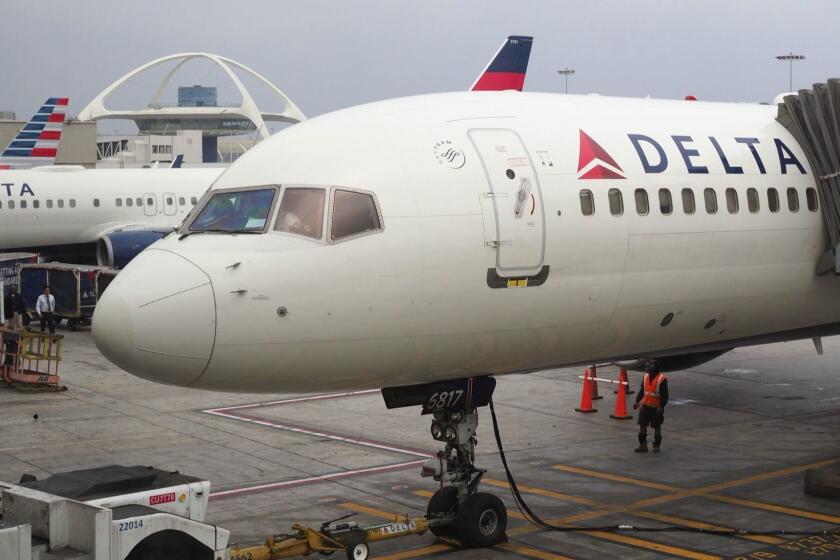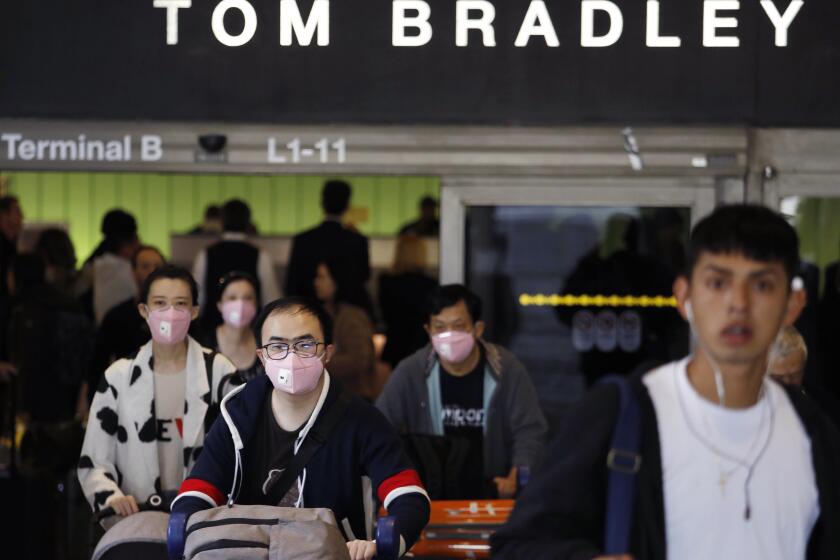Airbnb guests and hosts sort out coronavirus, one canceled visit at a time
- Share via
As the coronavirus threatens to upend the travel industry, executives of hotel, airline and cruise ship companies have been forced to confront sensitive questions of how to best protect their customers and employees.
In the growing corner of the travel world occupied by Airbnb, those issues are being hashed out one home-sharing host and guest at a time.
On an online message board for hosts, a man in Mumbai asked what he should do when he received an inquiry from a guest coming from China. “I am unsure if I confirm or cancel the booking,” he wrote.
A host from Tacoma, Wash., wrote on the same board that she’s “wiping down all door knobs, handles, light switches, and anything else that may have been touched by the previous guests.”
In some cases, travelers of Asian descent have reported host cancellations they see as discriminatory. And in one posting, a host in Rome wrote that they had a guest check out “because next door there is a family from Asia.”
“Two days before the trip, I got a message through the Airbnb app that said ... ‘Hey, sorry we are afraid of coronavirus,’” said Kavi Pandian, a Fulbright scholar from outside Atlanta who had his reservation for a German Airbnb canceled. “I got the impression ... that I might not have gotten that message if it weren’t clear from my profile that I was someone from Asian background.”
The outbreak began late last year in China and has now spread to almost every continent, killing more than 3,000 people total, including at least nine in the United States. Global economic growth could be cut sharply as factories in China and elsewhere shut down, endangering supply lines. Travel and tourism might be hit especially hard as travel restrictions kick in and conventions and other large-scale gatherings are canceled.
Airbnb spokeswoman Mattie Zazueta said she did not have information on whether home-sharing cancellations are up. But the spread of the disease comes at an inopportune moment for a company readying for an initial public offering.
The Business Roundtable event in Washington, D.C., is just one of many conferences affected by the novel coronavirus.
In a statement, Airbnb said, “[O]ur focus right now is on how we can best support our stakeholders as they are impacted by this global health challenge, including hosts, guests, employees and the communities in which we operate.”
The company, on its website, provides links to information about travel advisories and general information about the virus and urges people “to take necessary precautions to protect yourself when traveling or hosting.” Airbnb’s Zazueta said the company has also directly contacted hosts in some countries “to help them stay prepared and follow best practices.”
Depending on the timing of the booking, Airbnb said it would also allow guests and hosts to cancel without penalties if their booking is in mainland China or South Korea, or if guests are coming from those two locations. Usually, the host chooses a cancellation policy that sets limitations on how guests can receive a full refund.
The full-refund “extenuating circumstances” policy also applies to anyone, worldwide, who needs to comply with “disease control restrictions implemented by relevant governmental or health authorities,” as well as people “diagnosed or suspected of being infected with COVID-19 [the virus’ official name] by a medical or health authority.”
That doesn’t cover many people who are simply wary of getting on a crowded plane and traveling to other busy tourist destinations amid what may turn out to be a pandemic. Cancellations are hitting countries that haven’t seen widespread reports of the virus.
Here’s how planes and cruise ships are being disinfected to fight coronavirus. The travel industry is concerned about the financial hit from the outbreak.
Bogdana Butnar, who helps her elderly parents run an Airbnb in a Romanian mountain village, said two guests have already canceled, saying they have been warned against unnecessary travel.
“My expectation is this will impact this summer’s booking severely,” Butnar said in an email. “My parents are obviously disappointed [because] the extra income was nice and they loved having people staying at the house.”
On its website laying out the cancellation policy, Airbnb also asks “that all community members be mindful of respect, inclusion, and our nondiscrimination policy when interacting with other members of our community.” Zazueta said Airbnb would “investigate all reports of discrimination and take appropriate action when necessary, including up to removal of users from the platform.”
Pandian said Airbnb was very helpful, got him a full refund and gave him additional money to pay for a new place to enjoy a German festival.
But some guests consider the refund conditions arbitrary. For example, Airbnb’s offer of a full refund applies to guests traveling to mainland China who are checking in April 1 or earlier. In South Korea, it applies to guests checking in March 9 or earlier.
That leaves out people like Kevin Huynh of Corona. The 46-year-old electrical engineer booked a place in South Korea for a June family trip with his wife and two children. Concerned, they’ve decided to stay home.
“Airlines are trying to be accommodating,” says one travel industry analyst, “but they’re giving out refunds only on a case-by-case basis” in response to the coronavirus.
He said Airbnb initially told him he could only receive a 50% refund, but after he pushed back the company eventually offered a 50% refund and a 50% credit to book another trip. He said he’s holding out for a full refund because he doesn’t want to deal with Airbnb again after fighting with their customer service representatives.
Huynh’s experience shows how Airbnb’s business model can add complexity to resolving disputes at times like this. In one message, an Airbnb rep told Huynh the company’s hands were tied because the host was still willing to accommodate him and refused to agree to a refund.
“Every cancellation, especially those which blocked the host’s calendar dates for a few dates, are lost business opportunities [for the host]” the Airbnb employee wrote. “Therefore, your host is the best person to determine if this refund request is acceptable after taking business factors into consideration.”
The employee recommended that Huynh check the cancellation policy for future bookings, so “this kind of matter will be avoided in the future.”
Huynh replied: “Please tell me how I can avoid knowing in advance that a global virus outbreak will occur in the country that I will be traveling to. If you can I can definitely avoid this problem in the future.”
Zazueta, the Airbnb spokeswoman, said the company was sorry Huynh had a bad experience and noted it offered him a coupon as a “goodwill gesture.” She said cut-off dates for full refunds will be “updated as needed, as the situation evolves.”
There could be a silver lining for some domestic hosts. John Banczak runs TurnKey Vacation Rentals, which manages full-house vacation rentals in the United States on Airbnb and other websites. He said the company saw a large jump in bookings last week, something he attributes in part to coronavirus.
“They may be backing off on international plans and they are looking for alternatives,” Banczak said of vacationers.
More to Read
Inside the business of entertainment
The Wide Shot brings you news, analysis and insights on everything from streaming wars to production — and what it all means for the future.
You may occasionally receive promotional content from the Los Angeles Times.













